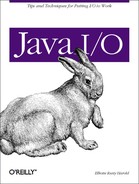The
java.io.PrintWriter
class is a subclass of java.io.Writer that
contains the familiar print() and
println() methods from
System.out and other instances of
PrintStream. It’s deliberately similar to
the java.io.PrintStream class. In Java 1.0
PrintStream was used for text-oriented output, but
it didn’t handle multiple-byte character sets particularly well
(or really at all). In Java 1.1 and later, streams are only for
byte-oriented and numeric output; writers should be used when you
want to output text.
The main difference between PrintStream and
PrintWriter is that PrintWriter
handles multiple-byte and other non-ISO Latin-1 character sets
properly. The other, more minor difference is that automatic flushing
is performed only when println() is invoked, not
every time a newline character is seen. Sun would probably like to
deprecate PrintStream and use
PrintWriter instead, but that would break too much
existing code. (In fact, Sun did deprecate the
PrintStream() constructors in 1.1, but they
undeprecated them in Java 2.)
There are four constructors in this class:
public PrintWriter(Writer out) public PrintWriter(Writer out, boolean autoFlush) public PrintWriter(OutputStream out) public PrintWriter(OutputStream out, boolean autoFlush)
The PrintWriter can send text either to an output
stream or to another writer. If autoFlush is set
to true, the PrintWriter is
flushed every time println() is invoked.
The PrintWriter class implements the abstract
write() method from
java.io.Writer and overrides five other methods:
public void write(int c) public void write(char[] text) public void write(String s) public void write(String s, int offset, int length) public void flush() public void close()
These methods are used almost identically to their equivalents in any
other Writer class. The one difference is that
none of them throw IOExceptions; in fact, no
method in the PrintWriter class ever throws an
IOException. If the underlying output stream or
writer throws an IOException, it’s caught
inside PrintWriter and an error flag is set. Read
the status of this flag with the checkError()
method:
public boolean checkError()
Since checkError() returns a
boolean, it only tells you that an I/O error has
occurred; it does not tell you what that error was. Furthermore, once
an error has occurred, checkError() always returns
true—there is no way to reset it so you can
test for later errors. On the other hand, you can indicate that an
error has occurred with setError():
protected void setError()
The main advantages of the PrintWriter class are
the nine-way overloaded print() method and the
10-way overloaded println() method. Any Java
object, variable, or literal can be printed by passing it to a
print() or println() method.
The println() method follows its argument with a
platform-dependent line separator (such as
)
and then flushes the output if autoFlush is
enabled. The print() method does not. Otherwise,
these methods are the same.
public void print(boolean b) public void print(char c) public void print(int i) public void print(long l) public void print(float f) public void print(double d) public void print(char[] text) public void print(String s) public void print(Object obj) public void println() public void println(boolean b) public void println(char c) public void println(int i) public void println(long l) public void println(float f) public void println(double d) public void println(char[] c) public void println(String s) public void println(Object o)
You should never use println(), either the
PrintWriter or the PrintStream
version, in networking code. Most network protocols like HTTP expect
to see a carriage return/linefeed pair as the line separator
character. If you use println(), your network
programs may run on Windows, but they’ll have problems on most
other platforms. Furthermore, these problems can be hard to diagnose,
because some servers and clients are more forgiving of improper
line-ending conventions than others.
